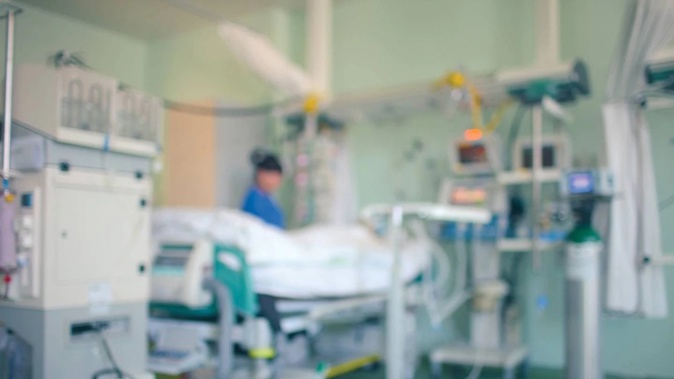
A Wellington doctor is warning the Government that hospitals may not cope with Covid-19 surges as they are already stretched beyond capacity.
Daily community cases in the current Delta outbreak continue to hover under 100, with 76 infections recorded yesterday and 91 on Thursday.
Three of yesterday's new cases were on the same chartered flight as New Zealand's first Omicron case, who tested positive at a Christchurch managed isolation facility after arriving from Auckland.
There are 51 Covid cases in hospitals across New Zealand, with five people in intensive care or high dependency units. The average age of those in hospital is 53, the Ministry of Health reported.
The doctor, who the Herald has agreed not to name, said Wellington Hospital had been recently operating at 100 per cent capacity, with 35 patients left waiting in the ED, including in corridors, for admission.
The doctor said the Wellington situation was not unique, with other hospitals also nearing capacity.
He said Health Minister Andrew Little's suggestion of throwing "some money at ICU and suddenly it will all be better" wasn't possible.
More than just physical beds were needed.
"An ICU bed is actually the least important part of it.
"If you don't have the level of medical nursing and medical skill wrapped around that bed, it's not an ICU bed, it's just a bed with some extra pipes attached."
Little announced more than half a billion dollars for hospital improvements from the Government's pandemic war chest, including $100 million in capital spending and $544m in operating costs, including staffing to prepare for widespread Covid next year.
The Wellington doctor wrote to Little previously stating that major surgeries were routinely put on hold or cancelled on the day due to lack of capacity in ICU or the general hospital.
"Sometimes ICU patients stay in a bed [there] as there isn't a ward bed to send [them to]. Conversely sometimes patients need to be pushed out early. These factors are dangerous, cruel and wasteful," the doctor wrote.
As time went on, patients were getting more frail and less fit for surgery, the doctor told the Herald.
"I suspect there's a whole raft of operations, and what happens is the so-called threshold keeps getting tinkered [with]. Not on the importance of care to the patients, but on the facility to provide. So people [are] left on a waiting list, which then gets the hospital further penalised for money, so it just actually makes the problem worse."
In the email to Little, the doctor said the "parlous" state of affairs was without the pressure of Covid, which could leave patients in beds for weeks or months.
"The 'potential bed' to cope with this does not exist. The staff for them to exist do not exist. The hospital is already grossly under-staffed. Nurses are already stressed and burnt out," they wrote to the minister.
In a statement, Little said he received information about hospital utilisation from the Ministry of Health, which sourced its information from DHBs.
"Rather than a single member of staff. I have not seen the figures referred to in your question."
Little said in order to improve capacity for ICUs, and put in place infection prevention and control measures to ensure other parts of a hospital were not jeopardised by treatment of Covid patients, it typically took investment.
"Part of the investment announced today [Thursday] includes funding for additional operating costs such as staffing."
A spokesperson for Little told the Herald the doctor's email, which was sent on November 26, had been received and they could expect a response in due course.
In New Zealand, most Covid cases would be handled at home, and with high vaccination levels, only 5 per cent of patients (or even less) might need hospital-level care.
However, ICU capacity is a concern, given New Zealand's per capita capacity is low compared to other OECD countries.
The new funding sought to address this.
Across the country, the newly announced funding will add 75 inpatient beds, 23 new intensive care unit (ICU) and high dependency (HDU) beds, eight temporary bed conversions to ICU, and 355 beds will be converted to isolation or negative-pressure environments.
The minister previously said roughly 1400 nurses were being trained to work in ICU or HDU environments to support ICU nurses if required.
Little said yesterday that through the pandemic there had never been more than 11 Covid-19 patients in ICU at any time.
Right now, the doctor said the situation wasn't just hard, it was "impossible".
And the doctor said the problem wasn't just related to spaces in ED, it's whether people could be moved out of ED when they needed care in specific wards.
"If there's nowhere to go, then these people end up sitting in ED and that just further clogs the place up."
Each day, they claimed, it was like playing musical chairs trying to find space for some patients.
"We'll sometimes end up waiting until 10 or 11 o'clock in the morning to be told whether or not we can actually go ahead [with a surgery], which again is a waste of half a day's operating, and then if you waste half a day it inevitably means whatever was in the second half of the waiting list won't get done."
Joy Farley, Capital and Coast, and Hutt Valley DHB service provider director, said as a tertiary provider serving the lower North and upper South Islands, Wellington Regional Hospital regularly operates at high occupancy.
"We recognise that increasing demand puts pressure on our staff, hospitals, and affects patients – however these challenges are not unique to our region and are experienced by other DHBs. It is well-documented that we need additional bed spaces to improve patient flow and to help us meet demand."
Farley said there were also well-documented immediate-term measures that they have implemented – such as early supported discharge and management of patients at home.
Like other DHBs, Farley said they know the emergence of Covid-19 cases in the community is a constant possibility and their Covid-19 resilience planning across the two DHBs is therefore ongoing.
"Our planning and enhancement works – along with our existing measures – mean that we are confident that we are equipped to manage cases that may arise, and people can be confident that our regional health service remains safe and will continue to be so into the future."
The Wellington doctor claimed attempts at cost-saving had resulted in an increase in gross inefficiency that results in patients waiting for days or weeks for the treatment they need.
Typically, they said those who are in ICU with Covid are there for a longer time than other patients, which they warned could block a bed that could have been used for "30, 60 patients".
While they said New Zealand was in an "enormously" better place than our overseas counterparts, they were worried staff burnout could happen here if hospitals see similar issues.
They said doctors were also legally vulnerable, because they can be held culpable for any patient harm as they knowingly work there.
"To work in a system that is flawed and hazardous and overstretched, we all do it, because it's better to do the best for a patient within what's there, rather than say 'I'll protect myself instead'. So we sort of take that risk instead."
They told the Herald the situation was pretty critical - there were delays in surgeries and compromised capacity.
"Even if we have a wonderful Covid circumstance, if we've got no spare capacity, whatever capacity gets taken is going to be at the cost of people [surgeries] not being done."
Take your Radio, Podcasts and Music with you









